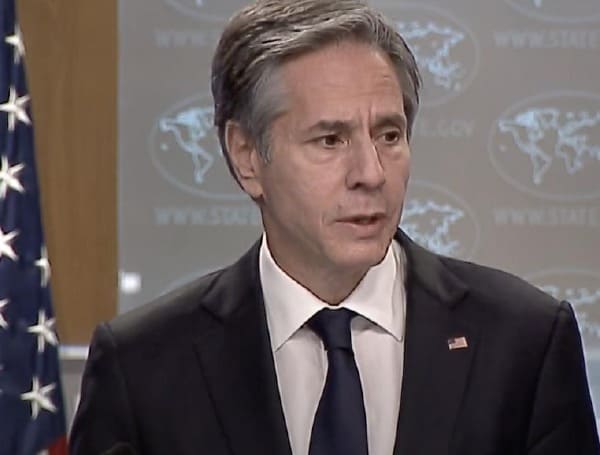On March 22-25, Secretary of State Antony J. Blinken will travel to Brussels, Belgium, to participate in the NATO Foreign Ministerial. During this visit, he will meet with NATO Secretary General Jens Stoltenberg, Allied Foreign Ministers, European Commission President Ursula von der Leyen, EU High Representative for Foreign Affairs and Security Policy Josep Borrell, and Belgian Deputy Prime Minister and Minister for Foreign Affairs Sophie Wilmès.
“We continue to support the goal of a Europe whole and free and at peace. The United States is fully committed to our NATO Alliance, and I welcome Europe’s growing investment in the military capabilities that enable our shared defense,” said President Joe Biden in a February statement.
Secretary Blinken will emphasize the strength of the Transatlantic relationship, NATO’s ongoing success in safeguarding the Transatlantic community, the Alliance’s adaptation to new security challenges, and the Administration’s desire to repair, revitalize, and raise the level of ambition in U.S.-EU relations.
NATO Continues to Adapt to the Future
- The Transatlantic relationship is built on a foundation of shared values, and NATO has been the cornerstone of an unprecedented period of peace and prosperity for more than 70 years.
- NATO is the essential forum for Transatlantic security – the only place where the United States meets daily with our Allies to address shared security challenges together. The U.S. commitment to our NATO Allies and Article 5 of the Washington Treaty is ironclad, and Allies are united in their shared mission to defend the Euro-Atlantic community, deter aggression, and project stability.
- Now entering its 72nd year, NATO is the most powerful and successful Alliance in history. NATO faced down the Communist bloc in the Cold War and today provides security for approximately one billion people in Europe and North America. The United States stands shoulder to shoulder with our Allies and NATO partners in NATO missions in Afghanistan, Iraq, Kosovo, and elsewhere. Together, the Alliance is deterring and defending against a wide range of security challenges including Russian aggression, terrorism, hybrid and cyber threats, and emerging and disruptive technologies. NATO is also working to address the risks China presents to our shared security interests, our democracies, and to the rules-based international order.
- The progress Allies have made on defense spending helps ensure NATO is ready and has the capabilities required to meet any challenge. European Allies and Canada have increased their defense spending by more than $130 billion since 2016. By the end of 2024, that number is projected to exceed $400 billion. These numbers are significant, but Allies must also continue to make investments in NATO capabilities, the readiness of their armed forces, especially the NATO Readiness Initiative, and force generation for NATO missions and operations.
- NATO also played a pivotal role in coordinating the civilian response to COVID-19, airlifting hundreds of tons of critical supplies around the world and building almost 100 field hospitals. NATO-EU coordination during the pandemic has been crucial, especially in efforts to combat disinformation. The United States encourages even more enhanced NATO-EU cooperation as part of an adapted NATO and revitalized transatlantic partnership.
- NATO leaders are actively considering the security implications of China’s aggressive and coercive behavior. Beijing is investing in infrastructure in Europe, while at the same time building up its military and expanding its footprint in cyberspace, the Arctic, and in areas that directly affect Transatlantic security, including the Middle East and Africa.
U.S. Cooperation with the European Union
- For more than 65 years, the United States and EU have had close diplomatic ties and partneredto address global and regional issues. We look forward to working with the EU to address shared challenges including COVID-19, climate change, Transatlantic data flows, and economic cooperation.
- The EU is one of our closest partners on a host of international efforts. U.S.-EU cooperation, based on our shared values, is crucial to upholding the rules-based international order and addressing global challenges emanating from Iran, Russia, and China.
- The United States and Europe share the most globally integrated economic partnership in existence. Accounting for nearly $1.3 trillion a year in goods and services trade and $5.6 trillion in mutual investment – sustaining 15 million jobs on both sides of the Atlantic – our economic relationship with Europe remains the largest in the world.
- The Transatlantic response to the COVID-19 pandemic far surpasses that of other donors. Together, the United States and the EU have pledged more than $40 billion to the global pandemic response.
- S. coordination with the EU takes place on many levels and encompasses a broad range of political and economic issues and global challenges. It includes meetings at the level of heads of state and government between the United States, the European Commission, and the country holding the EU Presidency.
Our Longstanding Partnership with Belgium
- Belgium is a close NATO Ally and a strong partner in security and defense, making valuable contributions to the Global Coalition to Defeat ISIS and NATO’s Resolute Support Mission in Afghanistan.
- The United States and Belgium are united in our efforts to provide humanitarian, reconstruction, and development assistance to Afghanistan, Iraq, and Africa.
- Belgium is the 12th largest investor in the United States, with over $70 billion in foreign direct investment, and supports more than 60,000 American jobs.
- On a daily basis, Belgium and the United States work closely to combat transnational criminal operations running illicit drug and money laundering operations through key ports.
- There is no greater example of what the United States and Belgium can do together than the extraordinary success achieved by Pfizer, whose scientists in the United States and Europe lead the world’s fight against the COVID-19 pandemic, and whose production facilities in Belgium are delivering that success to the world.
Other news: Trump’s Former Intel Director Expects Eye-Opening Report on UFOs This Spring
Support journalism by clicking here to our gofundme or sign up for our free newsletter by clicking here.
